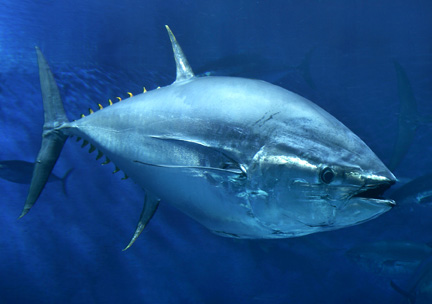
Can we muster the will to save endangered species that aren't cute and cuddly?
It's hardly an abstract question. IUCN -- The World Conservation Union -- has more than 1,200 species on its Red List. These animals and plants are, to varying degrees, on a path toward extinction. Many are ocean animals. Few are cute or cuddly, but they all need our help.
Over the past 25 years, I've found that having people meet and fall in love with marine life is a great starting place. It's the first and most powerful experience that places like the Monterey Bay Aquarium offer to visitors. This winter a LOT of people fell in love with sea otters, thanks in part to the presence of a stranded sea otter pup named Kit that we rescued and placed on exhibit after she was separated from her mother in the wild.
California sea otters are a threatened species -- a "cute" one with devoted and vocal advocates who support efforts to save them and speed their recovery. While their population still struggles, people care about sea otters and are making a difference.
For bluefin tuna at the aquarium, it's rarely love at first sight. But for visitors who see these powerful swimmers it is a memorable experience. And it opens a door for us to tell the story of the serious threats facing Atlantic bluefin tuna today.

These fish are amazing. They are the lions and tigers of the sea. At their largest, they can weigh more than 1,500 pounds. They routinely migrate between the warm waters of the Gulf of Mexico and the Eastern Mediterranean (where new generations are born) and the cold waters of the North Atlantic where they feed.
Though they reproduce in huge numbers, they can't keep up with fishing pressure. Bluefin numbers are plummeting -- down by 90 percent over the past four decades. That's because demand for high-end sushi has skyrocketed. Today, pound for pound, they're the most valuable fish in the sea, and the price on their head has pushed them to the brink. The first ceremonial bluefin of the season sells in Japan for as much as $175,000, and routine prices of $10,000 or more per fish are common in the wholesale market.
Though they aren't cute, there is hope for the bluefin.
More than a decade of scientific study by Stanford University, the Monterey Bay Aquarium and other partners has painted a clear picture of Atlantic bluefin migrations, and documented their spawning and feeding grounds. Our work has confirmed that bluefin are being taken at an unsustainable rate. Even if fishing was stopped entirely today, bluefin would take many years to recover.
Now, those data are the basis for a proposal -- endorsed by the United States, the European Union and other nations -- that would ban global trade in Atlantic bluefin tuna under the Convention on International Trade in Endangered Species (CITES). Fishermen could still catch and sell bluefin in their own countries, but they couldn't export their catch to Asia where high prices are fueling demand.
We fully support the ban because the international body responsible for managing -- and conserving -- bluefin tuna in the Atlantic has been unable to reduce fishing quotas to sustainable levels that the science supports.
Simply put, science has been trumped by economics, and the fate of Atlantic bluefin hangs in the balance.
Can science prevail, on behalf of an animal without the charismatic appeal of the giant panda, the tiger, the orangutan? Does the international community have the willpower to save a species with such a high price on its head? We'll find out this month, when negotiators meet in Doha, Qatar to decide the issue.
I'll be standing on the side of the un-cute, in favor of doing the right thing. If you'd like to join me, write the White House and urge the Obama Administration to negotiate the strongest possible international protection for Atlantic bluefin tuna at the CITES meeting. Send your message to the attention of Nancy Sutley, who chairs the President's Council on Environmental Quality.